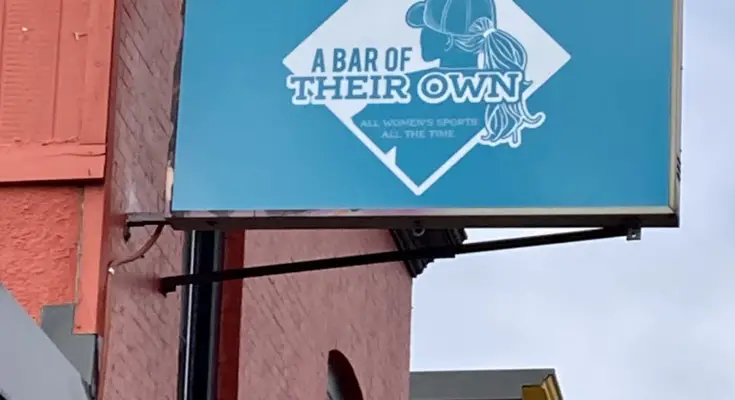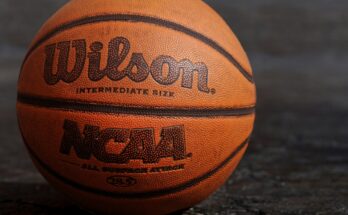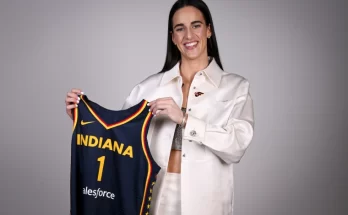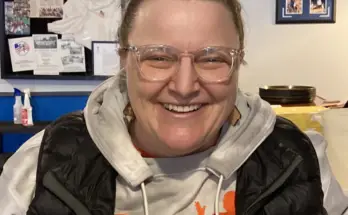In conversation with Jillian Hiscock, owner of Minneapolis’s newest all-women’s sports
sports bar, A Bar of Their Own:
MR – As much as I hate to assume anything, it has got to be more than word of mouth that
you’ll need to increase your clientele, and also, what I’m most curious about, what do you feel
What do you have to do to make people want to come here?
JH – Honestly, I’m not trying to sound conceited; I don’t think we have to do much. We have
been slammed for all thirteen days of our service since we’ve been open. I think it really is a demonstration that women’s sports fans are hungry for something like this to exist. Yes, we’ve had a lot of great media attention, which helps. I had people here from Colorado, Indiana, Montana, and Utah all sitting in the bar at the same time.
They’d all just heard about the bar and came in. So I think that because it is a unique enough concept that stands out to people, that rings a bell with people, people are seeking it out, which we had a feeling would happen. I think for me, what I’ve been pleasantly surprised within the last two weeks has been that there was a lot of speculation that this was going to be a lesbian bar, a queer bar, that this was only going to be for women, all these things that people were saying. But there has been such a diverse array of people
coming: families, young families, men coming in cis-straight, and men coming in to watch a basketball game. It’s so clear that people, not just queer women, like women’s sports.
I think it’s still so much of a perception that it’s all queer women. I think it probably skews that way,
but many women don’t know how to be women’s sports fans because they haven’t been able to watch it.
MR – Well, you answered two questions before I asked them. But I’m really happy and excited
to hear that. Now, I’m guessing that this didn’t all come out of your own pocket.
JH – It sure didn’t.
MR – Were there any obstacles in terms of securing financing?
JH – (Laughs) No, none! No, there were a lot. I started working on this with my wife in July of 2023, really getting serious about it, and in writing the business plan, we basically decided that we would have to come up with between $300,00 and $400,000 to get this thing started. We invested some of our personal capital in the bar, knowing that it would be a big risk to take a jump and a stab at it.
But pretty early on, I knew I wanted to do some kind of community fundraising because, to me, this whole thing is built on community. I want the place to be somewhere where people feel like they belong and that they’re a part of it, and, in socializing with friends, I was getting a lot of interest in, like, “How can we help? I don’t have a lot, but can I give you some help?” So we set a really ambitious goal of $200,000 in crowdfunding, hoping that that would at least get us a location secured so that we could start getting some things going until we could open our doors.
So we launched our website on Sept. 15 and our public crowdfunding on Sept. 30, 2023, and by Dec. 15,
which was when we closed the crowdfunding, we had raised $205,000 from over a thousand people in forty states and forge in countries. The most common donation was $25. It wasn’t like people were dropping 50K here and there, but people like me, who were like, yeah, I want to go watch a game there, have a beer and watch the Lynx.
So that was a huge part of it, getting that community support. Now it’s fun to seek people come in and say, “Hey, I gave money for this,” and that’s exactly what I wanted: people to come in a feel like they were a part
of this. So it’s really not about me. I’m the vessel that helped make it happen. I think it’s a place that some many people have wanted, and I was just the one with the privilege to jump off a cliff and do it. We did apply for SBA loans through a local bank but were denied for two reasons: one; we were told it wasn’t a proven concept, which we thought was funny, considering the Sports Bra made $1,000,000 in eight months, and two, we were told our collateral wasn’t high enough, which was hilarious, because out collateral was worth more than we were requesting. So we felt like that was a right of passage to be a small women-owned business.
MR – I’m sure you have your own private thoughts about that…
JH– Well, it’s just part of the process. At the end of the day, for us, it was, we knew we wanted
to go through the process because it was really helpful for us to get everything together and
be like, what is this going to cost us and how is this going to work? But we were able to figure it
out. We cut a lot of things that we were hoping to get done by opening day and said well, that
will happen six months after opening day, or it’s going to have to be a year two thing, because
we knew it was important to get this place open, more than anything.
That was a big piece of advice I’d gotten from Jennie: don’t try to make this perfect when you open because people are going to be so thrilled that you exist that they’ll be OK with things growing and building. There’s no way we could have opened the bar exactly how we wanted it to be. And we’re getting to know our clientele, what people want, what they need. People bring us stuff all the time, stuff to put up on the walls. So it was tough, but through the entire process, we really felt the community was backing us up. We raised $57,000 in the last 24 hours of the campaign.
MR – Have you received support from local businesses?
JH – Tons. We are so blessed to be in the Seward neighborhood. I loved this neighborhood
even before I knew I was going to have a restaurant here. Our neighbors on all sides of us
they’ve all been unbelievably supportive in everything from Pizza Lucé providing food for our
staff during training to Rebecca’s Bakery next door, where we’d send people waiting in line to
get coffee and pastries before opening. It’s just been a great community feeling all around,
which is exactly what I wanted it to be, in a community, not in some industrial park.
MR – When you talk about communities, there are really two: the physical community and the
patron community, which is very widespread. As you’ve said, you’ve had people from 40 states
and other countries, so it’s being able to embrace both communities in such a positive and
productive manner.
JH – Yes, it’s really been a cool melding of the two.
MR – And as you said before, the perception of it being a gay bar, lesbian bar, well, from my
point of view, my answer would be, “So what?”
JH – Mine too. And I do think that there is that perception. As a young woman growing up,
I didn’t see women’s sports on television, not until I was in my 20s, like actually seeing it in a
meaningful way, with college softball, when they finally started showing the college Women’s
World Series, things other than the Olympics.
In fact, a friend of mine came in with her two sons and told me that they would grow up in a world where women’s sports would be on TV and that that would change perceptions. I also want this to be a place where queer folk feel comfortable and where families feel comfortable. So far, I think we’ve done a really good job of creating an environment where people feel like we’re all here on this common ground where we can watch women’s sports.
MR – In terms of perception, I don’t get a sense that you’re necessarily out to change people’s
minds about anything other than this is a safe place, now it’s up to you.
JH – Yeah. I think it comes back to this idea of exposure in that I don’t spend much time fighting with trolls on the internet because I don’t have the patience or the energy, quite frankly. But I have had some legitimate questions from people, like, “You mean you can watch college softball on TV? Yes, come in and check it out. I think the exposure part of it is what has been so horribly lacking because of media deals or lack of media deals, or lack of prioritization.
So that’s starting to change, starting. I’ve said in a couple of interviews that women’s sports
coverage has tripled, which means it went from 5% to 15%, which is great but still 15%.
So it’s getting easier for me to show things on my TVs now than it would have been two years
ago. So, in terms of changing people’s minds, if people are interested in watching or learning
more about women’s sports, I want this to be a safe place where they can come and do that.
And I’m not going to engage with people who say, “No one watches women’s sports” or “trans
women are taking over,” I’m just not because those are minds that are not willing to be changed.
MR – It seems to me that for a while, it’s just going to be about sustaining. You’ve been open
thirteen days, so you’re not ready to plow off into the world and open up twenty more bars.
JH – (Big laugh)
MR – As the other places that you mentioned have inspired you, is that something that you
would actively do, to try and motivate other people…
JH – It’s already happening. I think that has been one of the cool things for me, too. As I said, we
publicly launched the website on Sept. 15, and by October, I’d already met with two other women who were interested in starting similar concepts in other parts of the country: Long Beach, California, and San Francisco. I’m meeting with someone from Kansas City, then someone from Atlanta, Chicago, New York. I’ve probably talked to people from fifteen or sixteen different cities. I’m meeting with someone from London. There’s one happening in Germany, and it’s happening all over the place. Just like Jennie opened that door to me and shared her time, wisdom, and knowledge, I absolutely want to do that. I think that’s the big difference between men’s and women’s sports bar owners. I think sometimes men try to beat each other out, but for me, the more women’s sports bars exist, the better.
MR – As opposed to competition, it can become more of a real network.
JH – I joked with Jennie that I wanted to get to a point where we created a kind of passport
that you had to go visit all of the women’s sports bars around the country and get a stamp in
all of them to get some cool prize. I don’t know what it is. But there could be twenty women’s
sports bars open in a year.
MR – It’s probably way too soon to think about the future in terms of what you might want to
do, how you might want to expand, but have you thought about that?
JH – I’m always thinking about the future. I’m a planner by nature. I think for me it’s not necessarily about expansion at this point, but what we want to do to hone in on the programming that we’re doing here. There’s so many things I want to do here. We’re getting ready for groups, but we’re so busy it’s hard for us to hold big private parties and things like that. We’re closed on Mondays and Tuesdays so that we can have groups for private parties.
I’d love to get into a better rhythm of hosting private events for teams and end-of-year parties. We were packed for the Iowa Big Ten championship. Right now, our staff is answering all kinds of questions about programming and games. Hopefully, we’ll get to a point where we have a posted schedule every week for what games will be on our TVs so our staff isn’t inundated with calls. But I get it. People are used to having to call around to find out where they can watch a game. I want the answer to be yes; we’re going to show that game.
MR – For me, I’d rather come here to watch a Lynx away game. There is nothing like the
camaraderie, regardless of who you are. Well, I think you’ve answered everything, even
questions I didn’t ask. I’m sure you have a ton of support from your friends.
JH – Oh yes, people helped paint, decorate, everything. Friends checking in. Am I tired? I
probably will be for a long time. You know, my wife and I had conversations about what this
would mean for our relationship, our friendships, our time, and all of those things because
we certainly didn’t want to get into something that was going to put those things at risk. We
have had so many people bend over backward to help make everything work: for us, for the
bar, for the staff, for anybody. It just goes to show how operating in a community, operating
collectively, can make things a lot easier.
MR – I do have one last question. Was there ever any negativity that made you stop and
think, do I really want to do this?
JH – One thing about me is that I’m a pretty determined person, so when I decided to do this in
July and I said that we were going to be open by the Big Ten Tournament; we were open by
the Big Ten Tournament.
That’s just kinda who I am. So, for me, it was a question of whether it was going to happen or what am I doing. I also expected the haters, so that made it easier to prepare. I would say, in terms of face-to-face negativity, we’ve had very little. We’ve had some people get upset because they have to wait. I think it isn’t a great problem to have to wait to get into a bar that shows women’s sports. But most people are wonderful about that. I think most of the negativity has come from the internet trolls who wouldn’t say
anything to your face but comment about women’s sports or trans women, any of the old gropes that they sit behind their computers and type on anything that they can.
I’ve had a couple of one-star Google reviews, which are pretty funny. It’s clear they’ve never been to this
bar. I’m the kind of person who doesn’t let those things get to me because I know in my heart that we’re doing the right thing and heading down the right path, and I’m not going to let those little insecure people take away from what we’re doing. I think one of the things that I learned early on in this process was that everybody has incredible ideas about something like this, and we wanted that. We wanted people’s ideas, and we got to the point where we started calling them data points. Someone would say something to us about what we should do, and we’d say that should be a data point, and we’ll consider it with everything else and determine if we need to pivot based on that information. But oftentimes, it isn’t a large pivot. It was taking in the feedback, the positive and the negative. But being resilient enough to pivot when things
happen and make changes as they come is what I think is going to make us successful.
I’m not set in my ways at all. I firmly believe that I will fail more than I succeed, so the more I learn from those failures, the better it will be and the easier it will be for me to succeed. So, I don’t let the little missteps get me down because what we’re doing is really positive. As my wife says, nobody is going to die doing what you’re doing. Like it’s not that big of a deal. You’re giving people a place to have a beer and watch a game. It’s not brain surgery. We’re just trying to create a place for people to feel safe.
MR – Of course, there are so many places you can go to watch a game, but not these games.
That uniqueness should make it stand out in such a way that it presents a necessary, and it is
necessary, a necessary choice for a community that is a lot bigger than people realize. You can
expect to see me here a lot. This place is what should be, without discussion.
For more information, check out A Bar of Their Own.
Follow Beyond Women’s Sports for more from the world of sports.





